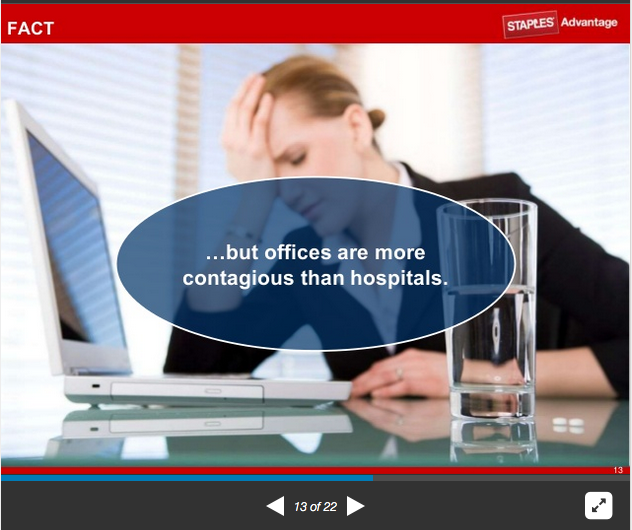Staples Flu Survey debunks myths: Is your office more germy than a hospital? Is your phone more germy than your keyboard?

Employees and employers are well aware of the impact of the flu on workplace productivity, but more than half of people surveyed (53 percent) say they have gone to work with the flu, according to the sixth annual flu season survey from Staples, a leading provider of supplies that help keep offices healthy. The findings show a strong understanding of how to stop the flu from spreading, but a disconnect in following key prevention techniques.
Respondents are knowledgeable about the flu and flu prevention
A high percentage of survey respondents indicated a strong knowledge of flu protection techniques:
- 90 percent know they can protect themselves from the flu by eating right and washing hands regularly.
- More than half (54 percent) know flu viruses can live up to three days on a surface.
- 43 percent know they are contagious one day before flu symptoms develop and up to five to seven days after getting sick.

But employees still come to work when sick. Of the 30 percent of respondents who came down with the flu last year, 55 percent still went to work sick, and although 59 percent say they should stay home when sick for two to three days, only 43 percent actually do so.
Employees are mindful of sick colleagues, with 88 percent of them having encouraged sick colleagues to go home—even if they don’t practice what they preach.
“It’s encouraging to see that employees have a strong understanding of flu risks and prevention, but there’s still work to be done,” said Dr. Charles Gerba, a professor of microbiology and environmental sciences at the University of Arizona who studies the transmission of pathogens through the environment. “Staples’ survey shows that less than ten percent of respondents sanitize their phone and only one percent sanitize their tablet – two of the dirtiest items employees come in contact with throughout the day. The flu wreaks havoc on U.S. employees and in turn on businesses every year. Simple measures such as cleaning, sanitizing and limiting exposure can make a huge difference.”
According to the survey,most employees (58 percent) are still coming to work sick because they feel there is too much going on at work to take a sick day, an uptick from 30 percent in 2012. Half of them feel the pressure to be at work or “tough it out,” and 25 percent don’t feel confident that someone else can handle their work when they’re out sick.
There is an even larger issue at the management level with 30 percent of business decision makers (BDMs) indicating their boss expects them to come to work if they have the flu, while only 19 percent of office workers say so. In fact, 39 percent of BDMs think that going to work while sick shows that they have extra initiative, compared to only 28 percent of office workers. More BDMs went into the office with the flu because of pressure to be at work compared to office workers (54 percent to 45 percent).
Flu season’s impact on businesses
Workers agree that workplace illness’s impact on a business is about as damaging as a natural disaster, more damaging than a product/customer service issue and nearly as damaging as a security breach.
“The flu is responsible for an estimated 70 million missed work days and billions of dollars in lost office productivity each year, so clearly businesses need to provide education and tools to keep workers healthy,” said Chris Correnti, Vice President of Staples Facility Solutions at Staples Advantage, the business-to-business division of Staples.
It’s not just missed workdays that have a detrimental impact – 66 percent of respondents say presentism – going into work sick but not maintaining productivity – is worse for a business than an employee staying home, a sharp increase from 31 percent last year.
About the Survey
The survey was conducted by Redshift Research among 1500 U.S. Office workers. All were working full-time and spend at least 50 percent of their time working in an office environment. 704 were managers and the remaining 796 were general office workers. Results of any sample are subject to sampling variation.
